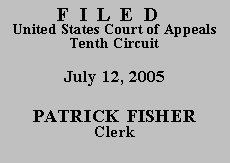

| UNITED STATES OF AMERICA, |
No. 04-2304 (D.C. No. CR-04-1289-WJ) (D. N.M.) |
Flores-Lerma faced a base offense level of 8, which was enhanced four levels under U.S.S.G. § 2L1.2(b)(1)(D) because he was previously deported after a felony conviction. With a two-level reduction for acceptance of responsibility, Flores-Lerma confronted a Guideline range of 15-21 months. The court sentenced him at the bottom of the range to 15 months' imprisonment.
On appeal, Flores-Lerma argues that the district court erred because it "clearly deemed itself bound by the mandatory application of the Sentencing Guidelines." Because he raised no objection to his sentence below, we review his sentence for plain error under the four-part test articulated in United States v. Olano, 507 U.S. 725 (1993), which asks (1) is there error; (2) is the error plain; (3) does it affect substantial rights; and (4) does it seriously affect the fairness, integrity, or public reputation of judicial proceedings. United States v. Gonzalez-Huerta, 403 F.3d 727, 732 (10th Cir. 2005) (en banc). A district court commits non-constitutional Booker error "by applying the Guidelines in a mandatory fashion, as opposed to a discretionary fashion, even though the resulting sentence was calculated solely . . . upon the fact of a prior conviction." Id. at 731-32. Therefore, the court below committed error. Moreover, the error is plain. Id. at 732.
Nonetheless, the defendant cannot show that the non-constitutional Booker error in this case seriously affects the fairness, integrity, or public reputation of judicial proceedings. See United States v. Cotton, 535 U.S. 625, 632-633 (2002) ("we need not resolve [the third prong] of the plain-error inquiry, because even assuming [defendant's] substantial rights were affected, the error did not seriously affect the fairness, integrity, or public reputation of judicial proceedings."). "[W]e will not notice a non-constitutional error, such as the one in the case before us, unless it is both 'particularly egregious' and our failure to notice the error would result in a 'miscarriage of justice.'" Gonzalez-Huerta, 403 F.3d at 736. Flores-Lerma raised no objection below to either the Pre-Sentence Report or to the sentence. He made no arguments in mitigation nor did he seek a downward departure. Moreover, the district court did not express any dissatisfaction with either the sentencing range prescribed by the Guidelines or the Guidelines' mandatory character. On appeal, Flores-Lerma merely asserts that because the district court sentenced him at the bottom of the range, it is possible that the court would sentence him lower on remand. That argument does not convince us that failing to remand for resentencing would result in a miscarriage
of justice. Accordingly, we AFFIRM the sentencing order entered by the district court.
ENTERED FOR THE COURT
Carlos F. Lucero
Circuit Judge
*. The case is unanimously ordered submitted without oral argument pursuant to Fed. R. App. P. 34(a)(2) and 10th Cir. R. 34.1(G). This order and judgment is not binding precedent, except under the doctrines of law of the case, res judicata, and collateral estoppel. The court generally disfavors the citation of orders and judgments; nevertheless, an order and judgment may be cited under the terms and conditions of 10th Cir. R. 36.3.